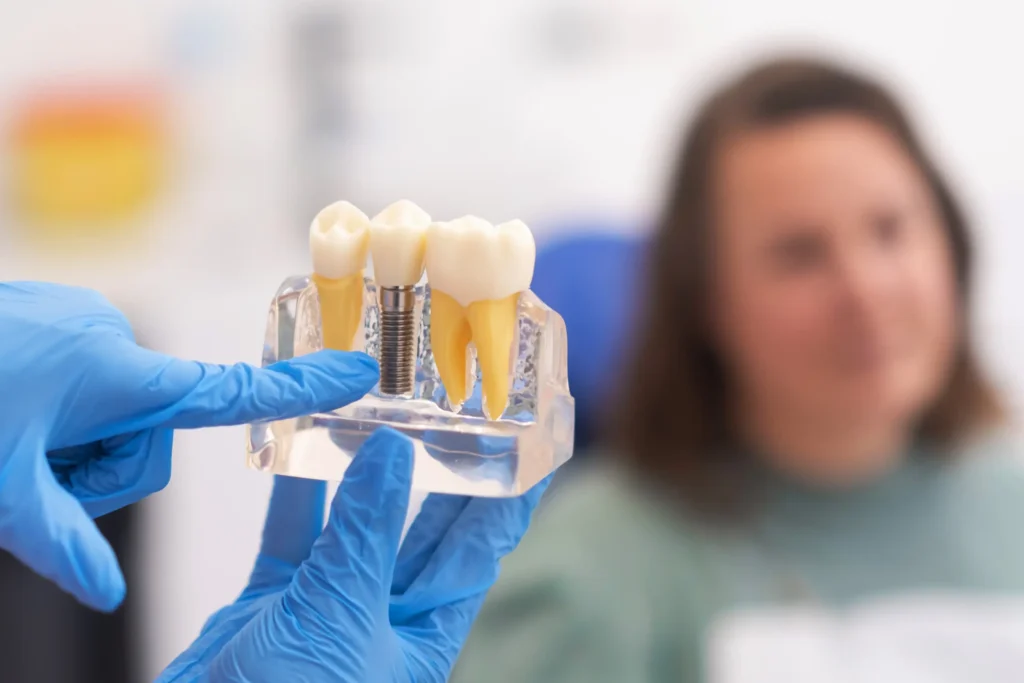Your guide to dental implants
Dental implants are proving to be a strong and permanent solution to the replacement of teeth, whereby people not only get to chew on the replacement teeth well but also have them look good. Implants require replacing a single tooth with up to a few teeth, unlike a general denture or bridge, in terms of the advantages offered. To give an understanding of this on this blog, we will explore what dental implants are, how the process is carried out, the advantages of having the procedure done, and some considerations to make if you are interested in a dental implant treatment.

Table of Contents
What is a dental implant?
An implant is a small surgical screw made of titanium that is inserted into your jawbone; it is designed to support a crown that replaces the missing tooth. During surgery, the doctor uses a drill to shape the bone and install a screw with the upper part that will be connected to the crown. This approach provides a permanent dental solution for those who are missing teeth, and you can stay without any concern for your implant.
Will my body reject the implant?
The word’ rejection’ is closely linked with transplants, but it is rarely a problem with dental implants. These implants are made from titanium and titanium alloy; this informs the high strength and low weight of the implants in addition to their biocompatibility. This means that there is a high probability that your body will not reject the implant.
How long does the process take, including healing?
The time that you will spend with the dentist depends on the number of implants you will be given, which could take about half an hour to several hours. It becomes difficult to determine the overall time taken throughout the entire process because it varies depending on special circumstances. Based on the state of your jaw, they may require a temporary crown to enable the gums to heal before the final tooth is installed.
However, your dentist is best placed to advise about your specific situation and can more effectively detail the timeline of the treatment. As for the pain after the implant is set, most of the patients do not feel any pain at all, and in most cases, only two paracetamols are necessary.
Is there an age limit for implant surgery?
Skeletal formation is usually completed at 15 to 16 years in girls and at 17 to 18 years in boys, so the general eligibility for insertion of an implant is 18 years. Also, as for the age factor, there is no restriction on how old a patient should be before being considered for implants; anyone, including the old, can undergo the procedure.
Therefore, anyone in overall good health who still has sufficient bone in their jaw can receive implants once their bone growth is set. However, some diseases that might develop at this or earlier age might make the implant surgery difficult.
However, your dentist is best placed to advise about your specific situation and can more effectively detail the timeline of the treatment. As for the pain after the implant is set, most of the patients do not feel any pain at all, and in most cases, only two paracetamols are necessary.
Who can't get implants?
Implants may not be appropriate in the following cases:
- Untreated Dental Issues: Periodontal diseases such as gums must be treated before implantation because they will cause the failure of the procedure. It is imperative to keep the mouth clean for individuals who may be at risk of developing gum problems.
- Incomplete Growth in Young Adults: Persons with numeral development issues, especially young adults who are not yet grown to the right size, should be aware that implants will not increase in size consistent with the growth of the breast, and this may cause some aesthetic challenges.
- Heavy Smokers and Alcohol Users: A person with heavy smoking habits or with cases of alcohol consumption may be at a higher risk concerning the success of dental implants.
- Certain Medical Conditions: Some situations that exclude people include specific diseases or he or she takes some certain type of medicine. /topic/order-lecture-discuss-your-health-with-your-dentist
- Financial Constraints: It is equally important to consider that patients who cannot afford the cost of the treatment or maintenance of the implants cannot proceed to have implants.
Dental implants make a huge difference in your life since they help to replace the missing piece of your smile, hence giving comfort. It is an outlasting solution, one that can provide service to you for many years once it is given proper care, and the smile you’ve always dreamed of is just a few visits away!
